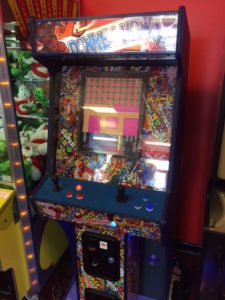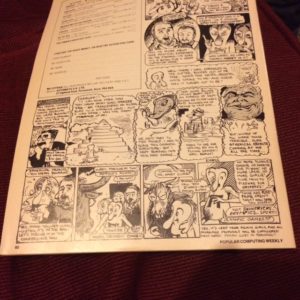On the 21st August I headed down to Portsmouth to interview Jas Austin about his career making computer games, and how that came about. One of the most interesting things about travelling to where people live or work when I interview them is not only that it is a more comfortable environment to conduct the interview, but it also allows people to show you objects or places of relevance to their own histories that you can later discuss when recording their memories.
This meant that the first part of the day was spent walking around Portsmouth, seeing what arcades were on offer and eating some good food at Pie and Vinyl, whilst discussing my project, and Jas’ histories of playing games. Like a few people I had already interviewed, arcades had played a role in Jas’ encounters with videogames. Although we didn’t get to the part of Southsea where he had once played in the arcades to see if it was still there, it was still fun to see what was on offer today and how arcades had changed over the years.

Portsmouth Arcades today (this is not really Donkey Kong)

A view of Southsea along from the arcade
It was also great to see the documentation Jas had kept from his earlier days of making games, including drawings from games such as Pi-Balled, some of his royalty amounts from Automata, as well as a rejection letter he had received about one of his games.
Pi-Balled sprites. From Jas Austin’s personal archive.
The oral history was spent charting a timeline of his interest in computing, including the role that maths and science played in this (as these were among some of his favourite subjects at school). Jas has been interviewed for various blogs, magazines and documentaries about his time making games in the 1980s (see links at the bottom of the page), so some of these were used as a starting point for further discussions about his computer studies course where he would program on piece of paper without a computer in sight, to the school getting a Commodore PET and on to how he had to do his O Level Computer Studies project work three times before an examiner finally passed it.
Much of this discussion focused on computer games and the role they played in the computer clubs after school, and then the local computer club set up in Portsmouth, which led to Jas’ first game Bunny being released by Automata.
Bunny, ZX Spectrum game, Jas Austin, 1983 on Vimeo.
Prior to this, Jas also wrote a listing for the Vic-20 called ‘Vic Lix’ in his school computer club, that although wasn’t published remains in his archive of game creation in the 1980s (listing coming soon!). The community of people in after school clubs and around Portsmouth both helped to shape some of what Jas experienced at the time, and although games were not part of his formal education, they were very much part of out of school activities. This included the work he did for Automata in Portsmouth. A more in-depth discussion of this time also focused on how his games were released and the role he played in this. For example, although Jas made the games, he didn’t necessarily have discussions about the box art for the games that did come out as he left that up to Mel Croucher and Christian Penfold at Automata. Further conversations about this revealed that he thinks the box art for his games Pi-Balled and Pi-in-‘Ere’ were probably illustrated by Robin Grenville-Evans, who also did the illustrations for Automata found at the back of Popular Computing Weekly magazine.

Automata cartoon strip in the back of Popular Computing Weekly, 9-15 February, Vol 3, No 6. From Jas Austin’s personal archive.
Video of Pi-Balled, uploaded by zxspectrumgames4 on YouTube.
The interview then continued to focus on setting up Creative Reality and making games such as The Fury and Rex, as well as how he then met Foo Katan for an interview at Bits through Jacqui Lyons where he did the conversion of R-Type for the Gameboy amongst other game releases. His game making career was not all plain sailing though and there were times when he had to go back to working in other jobs in order to pay the bills, but games prevailed as they still do today. The interview ended after discussions about working at Bits and the various games he contributed to there, as well as some of the people he worked with (including Tony Smith, who was the focus of another interview). However, it should be noted that Jas still continues to work on games today, both conversions and new releases along with the team at Origin8. This is the topic of another interview that will no doubt be continued with Jas in the near future.
A full transcript of the oral history will appear on this site next year.
Other interviews with Jas Austin online:
- https://www.gamestm.co.uk/interviews/in-conversation-with-jas-austin/
- http://zxspectrumgames.blogspot.co.uk/2014/05/spectrum-games-programmer-interview.html
- http://www.wizwords.net/the-making-of-rex-1/
